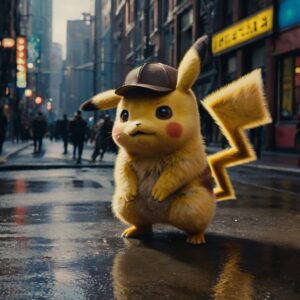 Today, one of the most massive finds of the century is video games, which weave vibrant stories with intricate characters and immersion. Naturally, Hollywood spotted that booming industry and saw an avenue of opportunity: the worldwide fan base seemed very easy to tap. The idea was basically the same for every game. Bring the beloved title up and running on the big screen, profit.
Today, one of the most massive finds of the century is video games, which weave vibrant stories with intricate characters and immersion. Naturally, Hollywood spotted that booming industry and saw an avenue of opportunity: the worldwide fan base seemed very easy to tap. The idea was basically the same for every game. Bring the beloved title up and running on the big screen, profit.
The first generation of game-licensed movies came out in the 1990s, with Super Mario Bros. (1993) and Street Fighter (1994) leading the pack. Despite the universal fame of the franchises, these adaptations were panned for weak plots and poor characterization and never captured the true spirit of the games. The problem was obvious: how do you replicate an interactive experience in a static medium without the loss of engagement?
With only a very few exceptions, studios kept going with game adaptations and made marginal improvements with production values and, sometimes, storytelling efforts—the fan base obviously compelled them to do so. Hawk franchises like Tomb Raider and Resident Evil got really lucky in some ways. They managed to pull in famous characters and somewhat more coherent stories, which given the fan base has amounted to mixed but somewhat positive forms of receptions. The tightrope between appealing to long term fans and reaching new audiences was still very tricky.
Why Video Game Movies Often Fail
One of the biggest challenges in adapting video games to movies is the sheer difference in how stories are told in these two forms of media. Video games rely heavily on player agency. You don’t just watch the story unfold—you interact with it. That sense of control and personal involvement is nearly impossible to replicate in a film.
Many game adaptations try to pack too much lore or overly complicated plots into the limited runtime of a movie. This overload can confuse viewers unfamiliar with the game and frustrate fans expecting faithful renditions. The tendency to focus on over-the-top action sequences sacrifices character development, making the story shallow.
Some video game movies are made with tight schedules, forcing rushed productions and underdeveloped elements. Studios sometimes push to capitalize on a game’s popularity without giving the creators enough creative control. This often leads to watered-down versions that don’t satisfy anyone.
Clichés and stereotypes haunt many adaptations. Tropes like the “chosen hero,” generic villains, and predictable plots are common. Instead of exploring the unique tones and themes that made the games popular, filmmakers fall back on safe, formulaic storytelling, which feels dull and uninspired.
Successful Examples and What They Got Right
 Despite the many failures, some video game films have made a positive impact, showing what’s possible when the adaptation is handled thoughtfully. Take Detective Pikachu (2019), for example. This movie rocked the gaming fandom by combining familiar characters with a new, engaging storyline and impressive visual effects. It respected the source material’s spirit while remaining accessible to newcomers. The voice acting and humor struck just the right note, resulting in both critical and commercial success.
Despite the many failures, some video game films have made a positive impact, showing what’s possible when the adaptation is handled thoughtfully. Take Detective Pikachu (2019), for example. This movie rocked the gaming fandom by combining familiar characters with a new, engaging storyline and impressive visual effects. It respected the source material’s spirit while remaining accessible to newcomers. The voice acting and humor struck just the right note, resulting in both critical and commercial success.
Another solid example is the Sonic the Hedgehog movies, especially the first installment. After initial backlash over character design, the redesign helped create goodwill among fans. The film cleverly embraced the series’ playful tone and provided fun action sequences balanced with some emotional moments, making it enjoyable for a wide audience.
The Resident Evil franchise, although uneven, deserves credit for sustaining multiple sequels and cultivating a dedicated fan base. The films leaned into the horror and action genres with a focus on intense sequences, and their portrayal of the lead character became iconic in its own right. While the movies didn’t perfectly mirror the games, they carved out their own universe, which helped them stand apart.
Successful adaptations typically share common traits. They understand the core appeal of the game—whether it’s the characters, mood, or story—and build their narrative around that, instead of attempting a direct, scene-by-scene translation. These films also take time in character development and world-building, giving audiences reasons to care beyond the action on screen.
The Impact of Fan Expectations
Gamers tend to have passionate relationships with their favorite titles, often spending dozens or hundreds of hours invested in these worlds. That deep connection raises expectations to an almost unreasonable level for filmmakers.
Fans want authentic portrayals of characters, faithful adaptation of key moments, and respect for the original game’s tone. If a movie deviates too much, adds unnecessary elements, or misrepresents beloved heroes and villains, it risks backlash. On the other hand, sticking too rigidly to the source can make an adaptation feel lifeless or confusing for those unfamiliar with the game.
Some movies have tried to satisfy all parties by incorporating Easter eggs and minor nods to hardcore fans while delivering a streamlined story for wider audiences. This approach sometimes results in diluted storytelling and inconsistent tones.
Social media has amplified fans’ voices, making reactions to trailers, casting, and plot details more immediate and widespread. Studios can no longer ignore backlash or praise during the production process. While this engagement can be beneficial, it also adds pressure on filmmakers to cater to vocal minority opinions, which may not represent the general audience.
How to Make Better Game-Based Movies
Collaboration with original game developers can help ensure authenticity and a deeper understanding of the source material. This partnership allows movies to capture subtle story beats and character nuances that might otherwise be missed.
Filmmakers should prioritize storytelling that suits cinema. Instead of trying to translate every game element onto the screen, they must craft narratives that stand on their own. Developing fresh stories within the same universe can provide new perspectives and appeal to more people.
Choosing actors who truly embody the characters can make all the difference in bringing game heroes and villains to life. The right performances help fans forgive some narrative liberties and connect emotionally with the film.
Rushed releases to capitalize on game hype often end poorly. Taking time for script rewrites, test screenings, and proper special effects can elevate a movie from mediocre to memorable.
Streaming platforms offer new opportunities to adapt video games into TV series, allowing for extended storytelling and character development. This format can solve many problems that movies face with time constraints and plot compression.